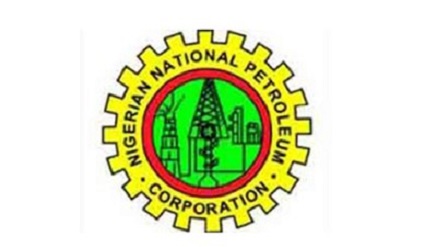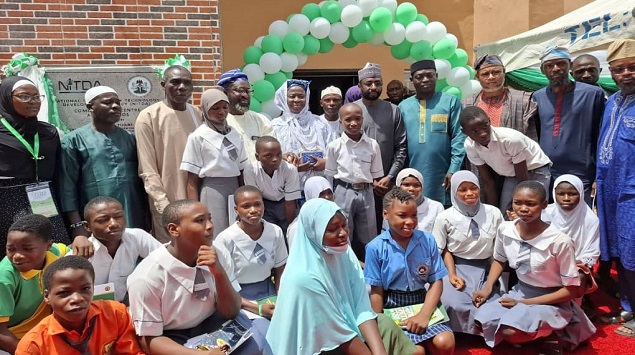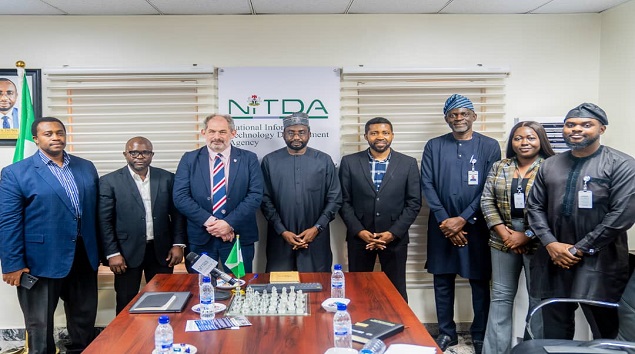General News
Buhari Queries NNPC’s Multiple Accounts

President Muhammadu Buhari was visibly angry when he revealed that the Nigerian National Petroleum Corporation (NNPC), has too many bank accounts, describing it as “improper”.
Buhari said either the Ministry of Finance or the corporation itself has lost track of some of the numerous bank accounts.
Buhari, a former petroleum minister and former Nigerian military head of state, spoke in Johannesburg, South Africa
As petroleum minister during the Chief Olusegun Obasanjo military regime, (1976-1979), Buhari, said NNPC had only three accounts, in contrast to what the former President Jonathan government bequeathed: “too many accounts such that the NNPC and the ministry of finance did not know how many accounts they had.”
Meanwhile, Buhari, will meet the head of a leading global watchdog on corruption to see how billions of dollars in oil revenue leakage can be curbed.
Reuters reports that the head of Oslo-based Extractive Industries Transparency Initiative (EITI) is expected to meet Nigeria’s president or vice president this week, its local arm said on Monday.
Stamping out corruption was one of the main pledges of new President Muhammadu Buhari’s campaign.
Clare Short, the head of EITI, has come to see how its recommendations can be implemented and help with long-term reforms. The intiative sets global standards for openness in the natural resources industries.
The executive secretary of EITI’s Nigerian arm (NEITI) said last week that over $7.5 billion between 1999-2011 still needed to be recovered from oil and gas companies in Nigeria.
“The amount represents clear cases of underpayments, under-assessments of taxes, royalties, rents…which have not been adequately addressed in the past,” Zainab Ahmed said.
NEITI has suggested selling the state oil company’s stakes in producing joint ventures to fix its budget woes, a call echoed by many in the new administration, as well as scrapping the expensive and graft-riddled fuel subsidy.
The government relies on oil sales for the bulk of its revenues but there has been little oversight of how these are handled.
Central bank governor Lamido Sanusi was sacked under former president Goodluck Jonathan after he said that up to $20 billion in oil revenues between 2012 and 2013 had not been remitted to the government by the state oil company NNPC. Buhari said he would re-examine this allegation.
Ahmed also said NEITI audits showed that some $11.6 billion of dividends between 1999 and 2012 from the government’s investment in the Nigerian Liquefied Natural Gas (NLNG) company were not remitted by the state oil company.
“NNPC was unable to provide any evidence that the funds were remitted to the federation as required by law,” she said.
NNPC said the issue of reconciling accounts had been raised at a previous Inter-Ministerial Task Team and would be discussed at one this week. The team was designed to implement NEITI’s findings.
NEITI has also said the sale of eight oilfields to NNPC’s upstream arm in 2010-2011 should be reviewed, as they were sold at $1.85 billion of which only $100 million was remitted to the federation account in February 2014.
Before his sacking, Sanusi also criticised some of these deals for being awarded non-competitively to companies that supplied no services.
General News
NITDA DG says its Community IT Centres Should be a Catalyst of Change

Kashifu Inuwa Abdullahi, director general of National Information Technology Development Agency (NITDA) has said that the 18 community IT centre the agency has built in the past two years are meant to be a beacon of calls and catalyst of change in those communities where they are cited.

He sated this at the commissioning/handing over of IT centre at Akesan area in Lagos. He noted that the IT centres, Innovation hubs among others are part of digital literacy programme of the agency.
“This center is designed and build to help Akesan community to be part of the digital economy, because the President is big and loud when it comes to national prosperity and inclusivity.
“Our target is to build more than 1600 across the country. We want every community every Nigerian to be part of this national prosperity and inclusivity when it comes to digital economy.
“Today, we are here to commission it, to ensure and encourage you to put it in a good use, because we call it a community center means that we want everybody to be part of it. We don’t want it to be suited in a school where the school will lock it for only students and the staff.
“That’s why we located it in the community. Schools can be part of it. Our senior citizens can be part of it. Our religious centers also can be part of it to learn.
“We want it to be a beacon of call as well as a catalyst of change in this community. We want to see more information technology gurus coming from Akesan community. So, I want to encourage you to also come with a sustainability model so that the center will be on. It is on because when you invest in this kind of infrastructure, we don’t want to be called when there are small things that we should come and fix it. That’s why we are handing it over to the community so that the community can put it in a good use. The community can find a way to make it self-sustaining,” he said.
Dr. ‘Bosun Tijani, Honourable Minister of Communications, Innovation & Digital Economy, the NITDA Community Centre in Lagos, a space that is more than just a building. It is a strategic extension of our national mission – a bridge between the Federal Government’s digital economy policies and the unmatched energy, ingenuity, and innovation that Lagos represents.
The minister who was represented by Mr. Johnson Bareyei, director, e-governmance in the ministry, added that his ministry is committed to promoting inclusivity through capacity building initiatives like the 3MTT programme.
“We are also developing the National Digital Economy & e-Governance Bill, which is a robust legislative framework that will help guide our everyday engagement online.
“Our work at the Ministry also includes Project BRIDGE, our ambitious effort to improve interconnectivity by deploying 90,000km of fibre-optic cable across Nigeria. This is a critical imperative as we work towards making Nigeria a $1trillion economy powered by innovation, infrastructure, and inclusive growth,” he said.
General News
NFIU Warns Against Use of BNBEX over False Claims

Nigerian Financial Intelligence Unit (NFIU) has dissociated itself from BNBEX’s activities and warned Nigerians against using the online trading platform.

BNBEX, a global cryptocurrency trading, with headquarters in Miami, Florida, USA, had claimed that the NFIU is conducting a compliance review of all transactions related to Nigerian users on her platform pursuant to Nigerian Financial Surveillance Regulation.
However, in a swift reaction, Sani Tukur, head, strategic communications department, the Nigerian Financial Intelligence Unit, said such circular was not issued by the NFIU and bears no connection whatsoever to any of the unit’s current regulatory or compliance initiatives.
According to him, ” the NFIU wishes to inform all financial system stakeholders and the general public that it did not authorise nor author the document recently posted by BNBEX on its website, which falsely claims that the NFIU is conducting a compliance review of all transactions related to Nigerian users on her platform pursuant to Nigerian Financial Surveillance Regulation.
“The NFIU categorically states the circular was not issued by the NFIU and bears no connection whatsoever to any of the Unit’s current regulatory or compliance initiatives.
“Secondly, the Unit wishes to state that ‘Nigerian Financial Surveillance Regulation’ referenced in the circular is non-existent and has no basis in Nigerian law or regulatory frameworks.
“It further states that the logo and insignia used in the circular does not belong to NFIU and is fake. Additionally, the Unit presently has no office situated at Central Business District, Abuja or any other location outside it’s head office at No. 1 Monrovia Street, Wuse II, Abuja.
“NFIU therefore, strongly dissociates itself from the claims made in the circular and urges members of the public to rely only on official NFIU channels for accurate and legitimate information. Finally, the Unit has no affiliation to the entity known as BNBEX nor validated any of its operations.
“For purposes of clarification or to report suspicious information purporting to be from the NFIU, please contact the Strategic Communications Department at info@nfiu.gov.ng.”
General News
NITDA Advocates Strategic Partnership in Research to Unlock Nigeria’s Digital Potential

Kashifu Inuwa, CCIE, the Director General of the National Information Technology Development Agency (NITDA), has emphasized the critical need for robust collaboration among academia, industry, and government.

This call was made during a working visit by a delegation from Lancaster University, United Kingdom, led by Professor Kirk Semple, Director of International Research, to NITDA’s corporate headquarters in Abuja.
The visit centred on exploring avenues for strategic collaboration under the Research and Innovation Partnership for Entrepreneurship (RIPE) programme, an initiative aimed at leveraging academic research and innovation to spur entrepreneurial development and economic transformation.
Addressing the delegation, Inuwa noted that Nigeria and Africa broadly face a significant research investment gap that continues to hinder the continent’s progress toward building knowledge-based economies. “For us to build a robust and sustainable economy, we need to invest in research. That is where we have a huge gap in Nigeria and Africa at large, we don’t invest in research,” he said.
Using agriculture as a case in point, Inuwa observed that many Nigerian farmers lack access to critical data and digital tools that could revolutionise productivity and resource efficiency. He stressed that research and development (R&D) are foundational to solving such sector-specific challenges and to informing policies and regulations that can accelerate digital transformation.
Inuwa further outlined NITDA’s focus on emerging technologies such as Artificial Intelligence (AI), Internet of Things (IoT), unmanned aerial vehicles (UAVs), blockchain, robotics, and additive manufacturing, noting that these technologies hold vast potential for solving local problems and creating new economic opportunities.
“The goal is to create a vibrant technology-research ecosystem that unites academia, industry, government, entrepreneurs, and risk capital,” he stated.
He further emphasised the need to align university curricula with real world industry demands, encouraging institutions to develop talent capable of addressing practical challenges through innovation. Inuwa also called for better coordination among stakeholders, warning against the inefficiencies of duplicative efforts.
Inuwa also referenced the eight strategic pillars identified by the Federal Government as drivers of national development. These include Reforming the economy for inclusive and sustainable growth, strengthening national security for peace and prosperity, boosting agriculture to achieve food security, unlocking energy and natural resources, enhancing infrastructure and transportation, focusing on education, health, and social investment, accelerating diversification through industrialisation and innovation, Improving governance and service delivery.
To support these priorities, Inuwa further highlighted NITDA’s Strategic Roadmap and Action Plan 2.0 (SRAP 2024–2027), which is structured around eight complementary pillars. These include Foster Digital Literacy and Cultivate Talents, build a Robust Technology Research Ecosystem, Strengthen Policy Implementation and Legal Framework, Promote Inclusive Access to Digital Infrastructure and Services, Strengthen Cybersecurity and Enhance Digital Trust, Nurture an Innovative and Entrepreneurial Ecosystem, Forge Strategic Partnerships and Collaboration, and Cultivate a Vibrant Organisational Culture and an Agile Workforce in NITDA.
“We place a strong emphasis on research because without it, you can not develop effective policies or regulations that drive real change in the ecosystem,” Inuwa added.
The meeting marked a significant step forward in NITDA’s commitment to international collaboration, aligning with the broader objectives of President Tinubu’s Renewed Hope Agenda, and positioning Nigeria to take a leadership role in the global digital economy through research-led innovation, DG stated.
In his earlier remarks, Professor Kirk Semple highlighted Lancaster University’s global research reputation and its commitment to strategic collaborations that deliver societal value. He described the (RIPE) programme as a vehicle for knowledge mobilisation moving beyond academic theory to practical application.
“Universities today are under pressure to demonstrate value beyond knowledge creation. Strategic partnerships like this with NITDA helps ensure research informed policy, supports innovation, and drives meaningful change in communities,” Semple said.
He also underscored the role of innovation in bridging the gap between academia and society, noting that universities serve as critical hubs for organisations especially those lacking R&D capabilities to access expertise and resources necessary for solving global issues like climate change, public health, and technological inequality.
Professor Semple concluded by affirming the importance of creating diverse, long-term networks that foster cooperation across sectors, emphasizing that the true measure of success lies in sustained impact rather than accolades.

 General News3 days ago
General News3 days agoNITDA Advocates Strategic Partnership in Research to Unlock Nigeria’s Digital Potential

 Telecom2 days ago
Telecom2 days ago₦800 Billion Infrastructure Plan Set to Boost MTN’s Network Quality Nationwide

 Telecom3 days ago
Telecom3 days agoGSMA Urges Governments to Prioritise Affordable Spectrum Costs to Support Global Digital Growth

 E-Business2 days ago
E-Business2 days agoNITDA, CISCO Empower Youth with Digital Skills

 Telecom3 days ago
Telecom3 days agoTelcos Worry over Possible 5 Percent Tax Return

 Telecom3 days ago
Telecom3 days agoSophos Launches MSP Elevate Program to Boost MSP Growth and Profitability

 E-Financial3 days ago
E-Financial3 days agoWhy and How Banks Fail in Nigeria by CIoD Chair

 Telecom3 days ago
Telecom3 days agoGet Ready: Google Unveils 8 Game-Changing Android Updates

























